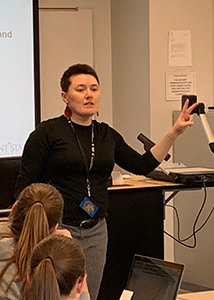
Kelsen LaBerge, Ph.D.
Associate Professor and Engineering Technology Coordinator
What are your academic degrees?
I have a Ph.D. in Mechanical Engineering from Case Western Reserve University and a BS in Mechanical Engineering from Ohio Northern University.
What inspired you to teach/to become involved in your industry?
I’ve always been the type of person to want to fix things. My toy of choice as a kid was Legos. They combine two things that I enjoy: building things and puzzles. My father, an electrical engineer, always encouraged me to go into engineering. After working for Honeywell for 30 years, my father retired and accepted a teaching position. I guess this is where I first got the idea that this was a possibility.
What is the best part of your job?
The best part of my job is watching students succeed. That instant when confusion goes to understanding is very rewarding for an instructor. I like to see my students grow from year to year as they start to grasp what it really means to be an engineer.
What is your best attribute?
Worst and best… I’m stubborn!
How many students you have taught over your years at KSU?
Approximately 150.
Why do you like working at KSU?
I’ve only taught here for one year and in that year, somehow managed to teach while going through cancer treatment. That doesn’t leave much time for enjoying things! I figured I should at least give a second year a shot!
What area of study do you enjoy most about your industry/field?
I mainly focused on vibrations analysis in my previous position. This could encompass a number of things. Specifically, I used vibration analysis to help determine the health of helicopter transmissions without actually taking them apart. Such analyses involve dynamics, programming skills, and signal processing. The idea of generating an algorithm that might one day, prevent a serious accident in a vertical lift vehicle is pretty cool!
What are you most looking forward to seeing in the future of CAE’s aeronautics and or engineering programs?
I think the aspect of CAE that most excites me is seeing where our students go after graduation. What jobs are they going to have? Are they going to go to graduate school? How have we succeeded in preparing them and where are the areas that we can improve?
What advice can you offer students just beginning their careers?
Find a mentor. It doesn’t have to be a formal arrangement through your company, but find someone that knows a lot about the field you are working in and learn from them! There are things that can’t be taught through a book that engineers need to know. Another piece of advice is to make sure you have a hobby outside of work. There are times when works is going to stress you out. You have to have something that allows you to calm your mind when you aren’t at work, so that when you come back to work after the weekend you are refreshed and ready to go. This could be a simple as working out a few days a week.
What kind of traits or characteristics are mandatory for a person in your industry to have?
To be an engineer, you have to have an ethical mind. Non-ethical engineers are dangerous. You have to be able to look at a design you are working on and say to yourself “I’d be ok with having my family member use this product.” If you can’t say that, then you need to change something. I think engineers also have to be able to take criticism objectively as input that will make them a better engineer and not as a personal attack.
What is your favorite topic to teach?
Dynamics because it’s cool!
